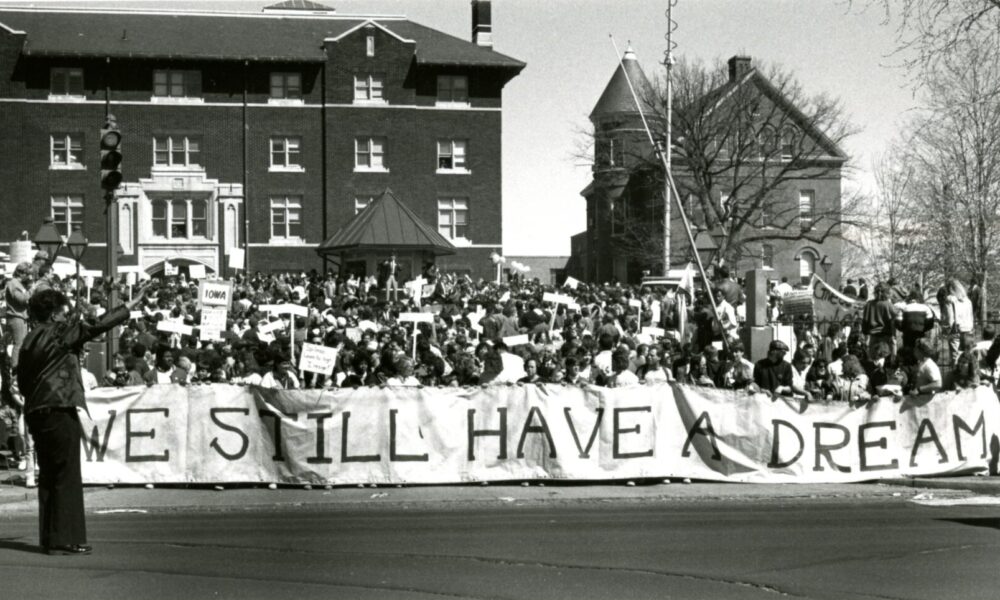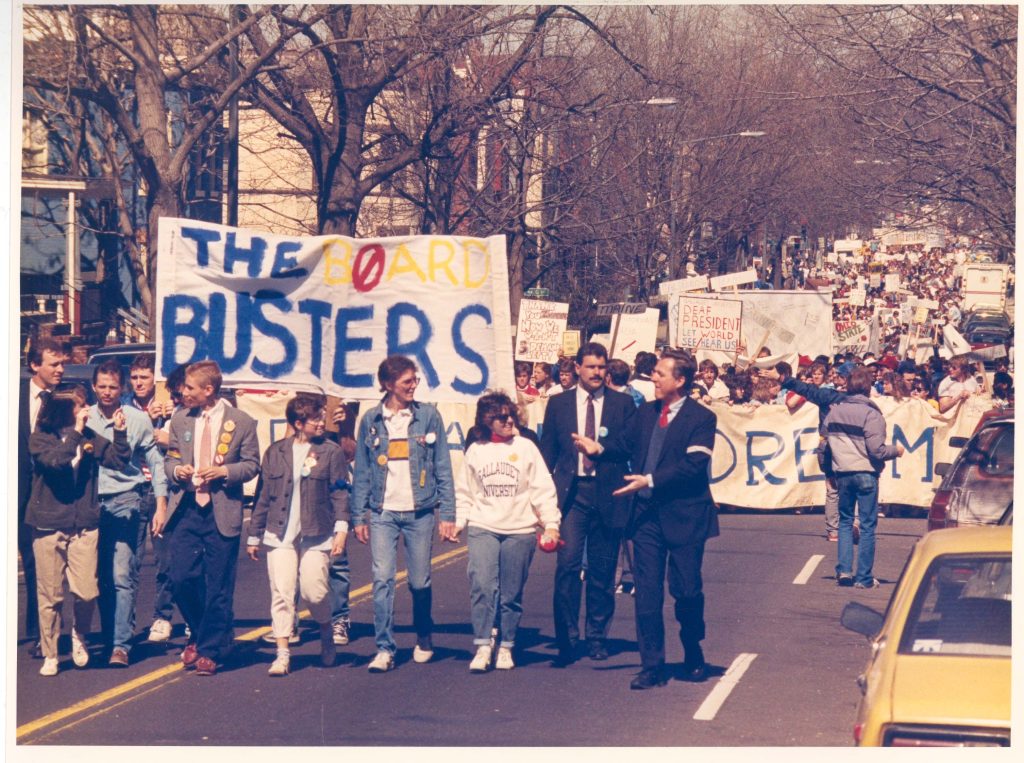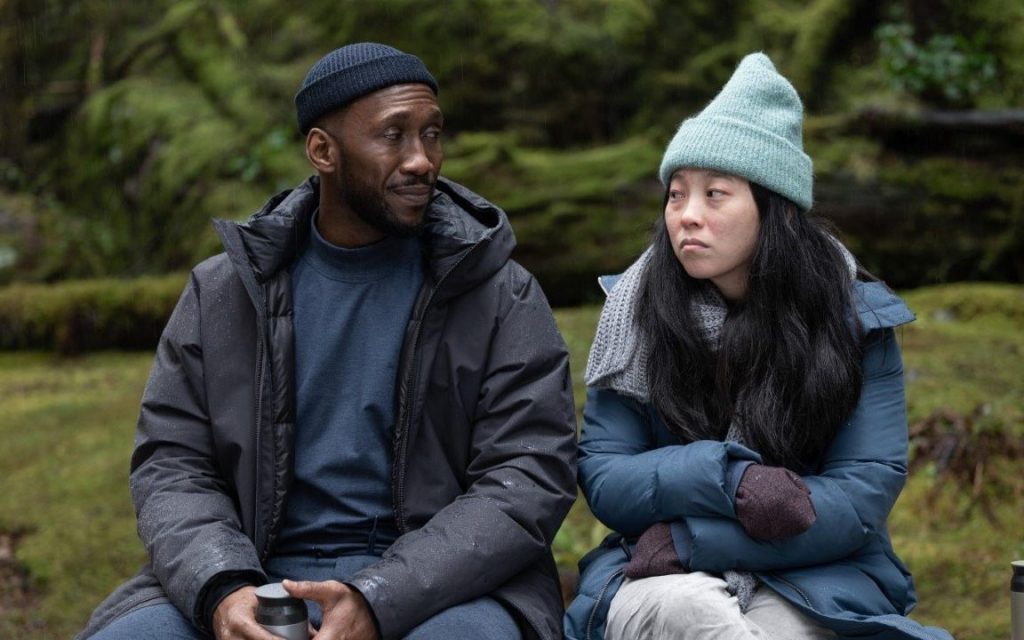KPop Demon Hunters Sing-Along


KPop Demon Hunters Sing-Along

By Lynn Venhaus
Angry about being dismissed, ignored and treated differently, deaf students had enough after yet another example of prejudice, so 37 years ago, they rose up in unison and forced the hearing world to listen.
The documentary “Deaf President Now!” is a fascinating look back at a little-known civil rights movement that had lasting impact for people with disabilities. Filmmakers Nyle DiMarco and Davis Guggenheim, as passionate as the student leaders they interviewed, recount a tumultuous time at Gallaudet University in 1988.
The student-led protest resulted in a turning point at the school, established in 1864 – the only U.S. college with a total deaf/hard of hearing student population — but also for deaf rights and representation, and in a broader sense, changes for others considered ‘disabled.’
The protests began after the Gallaudet board of trustees appointed a hearing person who did not know sign language, Elisabeth Zinser, as the next president. Two deaf candidates were finalists as well — Irving King Jordan, a dean at the school, and Harvey J. Corson, director at the American School for the Deaf in Hartford, Conn.

The students demanded that its first deaf president be appointed instead and shut down the campus for a week, from March 6 to 13.
The case gained national media attention after the new president, who had been president at University of Idaho, and Greg Hlibok, the leader of the student revolt, appeared on ABC’s “Nightline” – and afterwards, more support came from far and wide.
The board acquiesced, leading to the resignations of the board president, Jane Bassett Spihlman, clearly tone-deaf, who had stated: “Deaf people are not ready to function in a hearing world.”
When Zinser resigned, candidate I. King Jordan, who was hearing-impaired, was appointed. (He served for 18 years, and since then, they’ve always had a deaf president.)
Co-directors DiMarco, a deaf activist and the first deaf contestant to win “America’s Next Top Model” and “Dancing with the Stars” back-to-back, and Oscar-winner Davis Guggenheim, who was born in St. Louis, have deftly assembled interviews and archival footage to chronicle a pivotal moment in time.
Four of the main student organizers are interviewed, using sign language while others do voice-overs of what they say: Bridgetta Bourne-Firl, Jerry Covell, Tim Rarus, and Hlibok.

Guggenheim, who won many awards for his climate-change documentary “An Inconvenient Truth,” directed such acclaimed films as “Waiting for Superman,” “He Named Me Malala,” and “Still: A Michael J. Fox Movie.”
He and DiMarco use different techniques to establish what the hearing-impaired world goes through day in and day out, including silence. Through their clear understanding of the subject matter, they evoke empathy and bring out emotions that deepen our knowledge.
The students, who joined with alumni and faculty to lead the non-violent protest, tell their experiences while signing in ASL, and four voice-over actors speak for them. Abigail Marlow, Paul Adelstein, Tim Blake Nelson and Leland Orser relay the responses.
The way the 1 hour, 40-minute film is constructed is riveting, leading to a few surprises, and ultimately a satisfying wrap. Winner of the Audience Award at the 2025 SXSW Film Festival, “Deaf President Now!” is now streaming on Apple TV+.
Coverage of the game-changing protest and personal accounts of the ingrained prejudice of hearing people is certain to fire you up. To hear their plight is to react strongly to the injustices. And the snobby and elitist board president and others of wealth and privilege who act superior.

The deaf have a word for those clueless, arrogant people – “audists.”
The co-directors used some photo doubles when needed in recreations, and had a couple young people stand in for earlier versions of leaders – Charlton Hlibok and Danila Maucere as Greg and Bridgetta.
The outcome is earned, gratifying and its ripple effect is remarkable. Two years after their protest, the American Disabilities Act was passed
The deaf point of view is perceptive and the deaf community, proud of who they are, is inspiring. They stood up together and proved how valuable their voices were, making four demands that were met. And their backstories, about how much they have overcome, is illuminating for those of us in the hearing world.
. This story is dramatic and compelling, a real triumph.


Lynn (Zipfel) Venhaus has had a continuous byline in St. Louis metro region publications since 1978. She writes features and news for Belleville News-Democrat and contributes to St. Louis magazine and other publications.
She is a Rotten Tomatoes-approved film critic, currently reviews films for Webster-Kirkwood Times and KTRS Radio, covers entertainment for PopLifeSTL.com and co-hosts podcast PopLifeSTL.com…Presents.
She is a member of Critics Choice Association, where she serves on the women’s and marketing committees; Alliance of Women Film Journalists; and on the board of the St. Louis Film Critics Association. She is a founding and board member of the St. Louis Theater Circle.
She is retired from teaching journalism/media as an adjunct college instructor.

By Lynn Venhaus
Sometime in the future, Cameron (Mahershala Ali), diagnosed with a terminal illness, contemplates an alternative solution by his doctor (Glenn Close) – a clone will take his place, sparing his wife Poppy (Naomie Harris) and his young son Cory (Dax Rey at 8) the grief of his loss. They must not discover the deception. In this heavy — and heavy-handed “Swan Song,” altering their fate has consequences. Can he let go, and how much can we sacrifice in such cases?
With its daring premise and showing the technology to back up messing with fate, “Swan Song” takes us on an unusual journey. However, without two-time Oscar winner Mahershala Ali delivering a heart-wrenching performance – and this time in a dual role, this film would be a slow-moving ‘what if?’ storyline without much to recommend.
Writer-director Benjamin Cleary, who won an Oscar for his short “Stutterer” in 2015, raises ethical questions but fumbles by not fully develop any answers, or explain certain aspects about the likelihood of technology overreach and those inherent implications. Playing God has its costs. (And shouldn’t we know this?)
The tone is all over the place. It’s cold and clinical with a lot of fancy high-tech, slick 3-D graphics (Cam is a graphic designer) and sterile surroundings, but then it’s warm and fuzzy when depicting happy family scenes.
Dax Rey, as 8-year-old cute-as-a-button Cory, melts your heart during the time he spends with his father. As his wife Poppy, Naomie Harris has terrific chemistry with Ali – they were both Oscar-nominated for their performances in “Moonlight,” with Ali winning Best Supporting Actor in 2017. He won two years later for “Green Book.”
That trio’s emotional earnestness goes a long way in softening such disconcerting material. But it’s not enough to overcome what is, for the most part, a dull slog.

The small ensemble includes Awkwafina as a glum participant in the experiment who becomes friends with Cam.
The replica, who has been programmed with all of Cam’s memories, emotions, and experiences, is groomed to take over and will assume his place in the family. Two weeks after that, everything will seem normal – like there was no replacement and the clone won’t think he is a clone.
Some of the movie’s puzzling elements include not explaining his illness, and it’s just weird that the doctors have a compound where the dying live out their final days without their loved ones, who will never know about the secret experiments.
With any loss, not being able to say goodbye is always a regret. Therefore, this seems cruel, not helpful. Are we saying loss is too painful so let’s live a lie so that others, oblivious, will live longer happily ever after (up to a point).
Isn’t death an inevitable part of life? How we cope is key to the human experience.
Here, Ali’s Cam is jealous of the clone – and suspicious, and it’s all gone too smooth, except for him getting testy about the clone’s ease in assimilating into his former life. One of the reasons he wants to shield his wife is that her twin brother had died a year earlier, and she fell into a deep depression over his death.
These kinds of scientific fiction films are always trippy mind-benders, only this one happens to be just ‘meh.” We need more of a satisfying story to understand and accept it.
“Swan Song” appears incomplete, leaving out crucial details and then ending abruptly. Nevertheless, Ali has become one of our most reliable and exciting actors, so his performance is a standout in an otherwise tepid film.
“Swan Song” is a 2021 sci-fi drama written and directed by Benjamin Cleary. It stars Mahershala Ali, Naomie Harris, Glenn Close, Awkwafina and Dax Rey and is rated R for heated language. In select theaters and streaming on Apple TV+ starting Dec. 17. Lynn’s Grade: C


Lynn (Zipfel) Venhaus has had a continuous byline in St. Louis metro region publications since 1978. She writes features and news for Belleville News-Democrat and contributes to St. Louis magazine and other publications.
She is a Rotten Tomatoes-approved film critic, currently reviews films for Webster-Kirkwood Times and KTRS Radio, covers entertainment for PopLifeSTL.com and co-hosts podcast PopLifeSTL.com…Presents.
She is a member of Critics Choice Association, where she serves on the women’s and marketing committees; Alliance of Women Film Journalists; and on the board of the St. Louis Film Critics Association. She is a founding and board member of the St. Louis Theater Circle.
She is retired from teaching journalism/media as an adjunct college instructor.

By Lynn Venhaus
“Palmer” may be predictable, but it’s a heartwarming relatable story about acceptance and second chances.
After 12 years in prison, former high school football star Eddie Palmer (Justin Timberlake) returns home to put his life back together, Living with his grandma (June Squibb), he forms an unlikely bond with neighbor Sam (Ryder Allen), an outcast boy from a troubled home.
This modest film uses the trope of small minds in a small town as its setting in Louisiana, which works for the character of a young nonconformist who doesn’t care about fitting into a gender lane. And leads to the bond he forms with an ex-con starting over.
Cheryl Guerriero’s screenplay has created roles that the cast plays convincingly. Newcomer Ryder Allen delivers a poignant performance as Sam, who is bullied for his feminine-leaning proclivities, like wearing a princess costume for Halloween and playing with dolls.
Justin Timberlake, the Tennessee-born music superstar, is strong as straightened out Eddie Palmer trying to fly right. He’s always been a likeable personality, from his days on “The All-New Mickey Mouse Club” to his boy band popularity to his five times hosting “Saturday Night Live” and his Grammy-winning solo career (10 wins, 39 nominations).
In his few movie appearances, he’s been a natural. Here, he must carry the movie, and he’s believable at every step. He becomes the father figure to Sam, and there isn’t a false move from either of them.
Their bond is genuine. Over time, they become to rely on each other as Sam stays at Palmer’s house – his drug-addict mom Shelly (Juno Temple) has taken off with her boyfriend Jerry (Dean Winters) – and Eddie has been hired as a janitor at Sam’s elementary school. Eddie becomes his watchdog and caretaker.
The supporting cast is strong, too, with Alisha Wainwright as helpful third grade teacher Miss Maggie, who begins dating Eddie, and Juno Temple as Sam’s irresponsible mother.
Ninety-year-old June Squibb, from Vandalia, Ill., is Eddie’s crotchety but loving grandmother Vivian, a devout churchgoer and benevolent neighbor to Sam and his mother.
Actor-director Fisher Stevens directed fluidly, simply letting the story be told.
Once in a while, you discover a sweet story about people struggling to make things right in their world. “Palmer” succeeds in bringing together people who need each other, whose lives are changed because of their association.
“Palmer” is a drama directed by Fisher Stevens and starring Justin Timberlake, Ryder Allen, June Squibb, Juno Temple, Alisha Wainwright and Dean Winters. Rated R for language, some sexual content and nudity, and brief violence, it runs 1 hour, 50 minutes. Available Jan. 29 on Apple TV+. Lynn’s Grade: B

Lynn (Zipfel) Venhaus has had a continuous byline in St. Louis metro region publications since 1978. She writes features and news for Belleville News-Democrat and contributes to St. Louis magazine and other publications.
She is a Rotten Tomatoes-approved film critic, currently reviews films for Webster-Kirkwood Times and KTRS Radio, covers entertainment for PopLifeSTL.com and co-hosts podcast PopLifeSTL.com…Presents.
She is a member of Critics Choice Association, where she serves on the women’s and marketing committees; Alliance of Women Film Journalists; and on the board of the St. Louis Film Critics Association. She is a founding and board member of the St. Louis Theater Circle.
She is retired from teaching journalism/media as an adjunct college instructor.